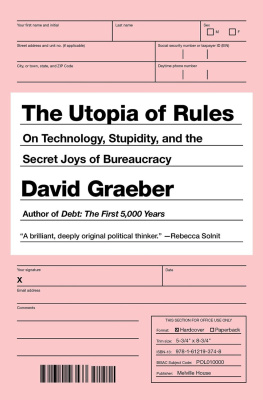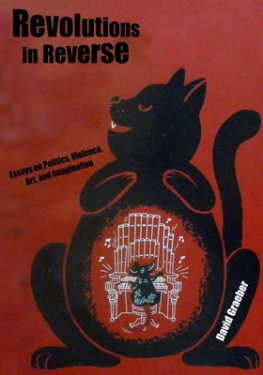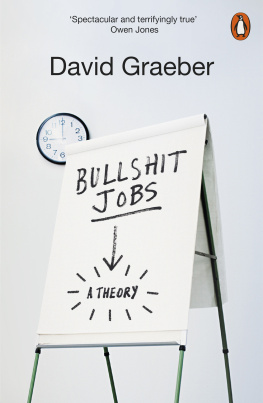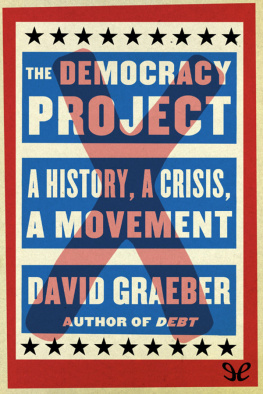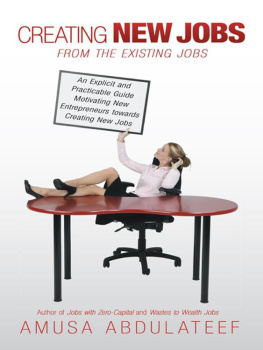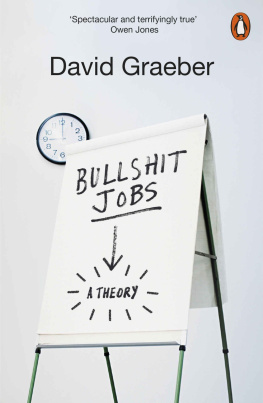Thank you for downloading this Simon & Schuster ebook.
Get a FREE ebook when you join our mailing list. Plus, get updates on new releases, deals, recommended reads, and more from Simon & Schuster. Click below to sign up and see terms and conditions.
CLICK HERE TO SIGN UP
Already a subscriber? Provide your email again so we can register this ebook and send you more of what you like to read. You will continue to receive exclusive offers in your inbox.
We hope you enjoyed reading this Simon & Schuster ebook.
Get a FREE ebook when you join our mailing list. Plus, get updates on new releases, deals, recommended reads, and more from Simon & Schuster. Click below to sign up and see terms and conditions.
CLICK HERE TO SIGN UP
Already a subscriber? Provide your email again so we can register this ebook and send you more of what you like to read. You will continue to receive exclusive offers in your inbox.
ALSO BY DAVID GRAEBER
Debt: The First 5,000 Years
The Utopia of Rules: On Technology, Stupidity, and the Secret Joys of Bureaucracy

Simon & Schuster
1230 Avenue of the Americas
New York, NY 10020
www.SimonandSchuster.com
Copyright 2018 by David Graeber
Most names and many identifying characteristics have been changed.
All rights reserved, including the right to reproduce this book or portions thereof in any form whatsoever. For information, address Simon & Schuster Subsidiary Rights Department, 1230 Avenue of the Americas, New York, NY 10020.
First Simon & Schuster hardcover edition May 2018
SIMON & SCHUSTER and colophon are registered trademarks of Simon & Schuster, Inc.
For information about special discounts for bulk purchases, please contact Simon & Schuster Special Sales at 1-866-506-1949 or .
The Simon & Schuster Speakers Bureau can bring authors to your live event. For more information or to book an event, contact the Simon & Schuster Speakers Bureau at 1-866-248-3049 or visit our website at www.simonspeakers.com.
Interior design by Carly Loman
Jacket design by David L Itman
Library of Congress Cataloging-in-Publication Data is available.
ISBN 978-1-5011-4331-1
ISBN 978-1-5011-4334-2 (ebook)
To anyone who would rather be doing something useful with themselves.
Contents
(On Spiritual Violence, Part 1)
(On Spiritual Violence, Part 2)
Preface:
On the Phenomenon of Bullshit Jobs
In the spring of 2013, I unwittingly set off a very minor international sensation.
It all began when I was asked to write an essay for a new radical magazine called Strike! The editor asked if I had anything provocative that no one else would be likely to publish. I usually have one or two essay ideas like that stewing around, so I drafted one up and presented him with a brief piece entitled On the Phenomenon of Bullshit Jobs.
The essay was based on a hunch. Everyone is familiar with those sort of jobs that dont seem, to the outsider, to really do much of anything: HR consultants, communications coordinators, PR researchers, financial strategists, corporate lawyers, or the sort of people (very familiar in academic contexts) who spend their time staffing committees that discuss the problem of unnecessary committees. The list was seemingly endless. What, I wondered, if these jobs really are useless, and those who hold them are aware of it? Certainly you meet people now and then who seem to feel their jobs are pointless and unnecessary. Could there be anything more demoralizing than having to wake up in the morning five out of seven days of ones adult life to perform a task that one secretly believed did not need to be performedthat was simply a waste of time or resources, or that even made the world worse? Would this not be a terrible psychic wound running across our society? Yet if so, it was one that no one ever seemed to talk about. There were plenty of surveys over whether people were happy at work. There were none, as far as I knew, about whether or not they felt their jobs had any good reason to exist.
This possibility that our society is riddled with useless jobs that no one wants to talk about did not seem inherently implausible. The subject of work is riddled with taboos. Even the fact that most people dont like their jobs and would relish an excuse not to go to work is considered something that cant really be admitted on TVcertainly not on the TV news, even if it might occasionally be alluded to in documentaries and stand-up comedy. I had experienced these taboos myself: I had once acted as the media liaison for an activist group that, rumor had it, was planning a civil disobedience campaign to shut down the Washington, DC, transport system as part of a protest against a global economic summit. In the days leading up to it, you could hardly go anywhere looking like an anarchist without some cheerful civil servant walking up to you and asking whether it was really true he or she wouldnt have to go to work on Monday. Yet at the same time, TV crews managed dutifully to interview city employeesand I wouldnt be surprised if some of them were the same city employeescommenting on how terribly tragic it would be if they wouldnt be able to get to work, since they knew thats what it would take to get them on TV. No one seems to feel free to say what they really feel about such mattersat least in public.
It was plausible, but I didnt really know. In a way, I wrote the piece as a kind of experiment. I was interested to see what sort of response it would elicit.
This is what I wrote for the August 2013 issue:
On the Phenomenon of Bullshit Jobs
In the year 1930, John Maynard Keynes predicted that, by centurys end, technology would have advanced sufficiently that countries like Great Britain or the United States would have achieved a fifteen-hour work week. Theres every reason to believe he was right. In technological terms, we are quite capable of this. And yet it didnt happen. Instead, technology has been marshaled, if anything, to figure out ways to make us all work more. In order to achieve this, jobs have had to be created that are, effectively, pointless. Huge swathes of people, in Europe and North America in particular, spend their entire working lives performing tasks they secretly believe do not really need to be performed. The moral and spiritual damage that comes from this situation is profound. It is a scar across our collective soul. Yet virtually no one talks about it.
Why did Keyness promised utopiastill being eagerly awaited in the sixtiesnever materialize? The standard line today is that he didnt figure in the massive increase in consumerism. Given the choice between less hours and more toys and pleasures, weve collectively chosen the latter. This presents a nice morality tale, but even a moments reflection shows it cant really be true. Yes, we have witnessed the creation of an endless variety of new jobs and industries since the twenties, but very few have anything to do with the production and distribution of sushi, iPhones, or fancy sneakers.
So what are these new jobs, precisely? A recent report comparing employment in the US between 1910 and 2000 gives us a clear picture (and I note, one pretty much exactly echoed in the UK). Over the course of the last century, the number of workers employed as domestic servants, in industry, and in the farm sector has collapsed dramatically. At the same time, professional, managerial, clerical, sales, and service workers tripled, growing from one-quarter to three-quarters of total employment. In other words, productive jobs have, just as predicted, been largely automated away. (Even if you count industrial workers globally, including the toiling masses in India and China, such workers are still not nearly so large a percentage of the world population as they used to be.)
Next page

